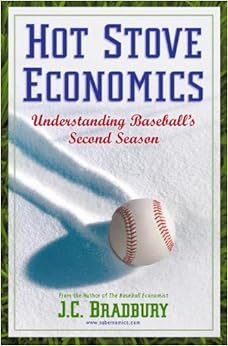
Hot Stove Economics: Understanding Baseball's Second Season Download Free (EPUB, PDF)

The final out of the World Series marks the beginning of baseball's second season, when teams court free agents and orchestrate trades with the hope of building a championship contender. The real and anticipated transactions generate excitement among fans who discuss the merit of moves in the arena informally known as the “hot stove league.” In Hot Stove Economics, economist J.C. Bradbury answers the hot stove league's most important question: what are baseball players worth? With in-depth analysis, Bradbury identifies the game’s best and worst contracts―revealing the bargains, duds, and players who are worth every penny they receive. From minor-league prospects to major-league MVPs, Bradbury examines how factors such as revenue growth, labor rules, and aging― even down to the month in which players are born―shape players' worth and evaluates how well franchises manage their rosters. He broadly applies the principles of economics to baseball in a way that is both interesting and understandable to sports fanatics, team managers, armchair economists and students alike.

Paperback: 262 pages
Publisher: Copernicus; 2011 edition (October 6, 2010)
Language: English
ISBN-10: 1441962689
ISBN-13: 978-1441962683
Product Dimensions: 6.1 x 0.6 x 9.2 inches
Shipping Weight: 13.6 ounces (View shipping rates and policies)
Average Customer Review: 3.2 out of 5 stars See all reviews (4 customer reviews)
Best Sellers Rank: #1,191,979 in Books (See Top 100 in Books) #295 in Books > Business & Money > Industries > Sports & Entertainment > Sports #975 in Books > Business & Money > Education & Reference > Statistics #2054 in Books > Science & Math > Mathematics > Applied > Statistics

I like the work that JC Bradbury does in both this book and on his blog. He raises interesting questions and tries to answer them in a scientific manner. However, he has a me against the world mentality, complete with refusing criticism of his work. Most members of the sabermetric community do not agree with the conclusions that he draws. This is good in the sense that it drive discussion, but he does not want to be included in the conversation (specifically asked not to be) when addressing new and controversial ideas.
The author obviously did not pay for a copy editor ("loose" instead of "lose", Tampa Bay Devil Rays and Tampa Bay Rays in the same table, "Image that" instead of "Imagine that", to/too, etc.), and the large number of mistakes, misplaced words, and other issues makes the book hard to read.As for the content, it's nothing special, either. I imagine the book would be more interesting to someone who doesn't keep up with baseball analytics, but for me, there was really nothing earth-shattering in it. And none of the author's approaches to analytics, and teasing out different causes and effects, struck me as particularly clever or new.
This book is great for the fan that likes to do a little math and get some real perspective on value. Highly recommemded to all!
I enjoyed Bradbury's previous book, The Baseball Economist, but this book fell far short. Bradbury's arguments in this book appear to be only spewing arguments from his previous work. Furthermore, some of his arguments (e.g. arguing that baseball talent is normally distributed) does not comport with the work of many other sabermetricians (believing that talent skews to the left tail). Bradbury only provides a few pages to argue why he believes talent is normally distributed, and appears to ignore all the work of other mathematicians which balances in the other direction. Finally, the book is poorly edited. There are plenty of typos in the book, which is not necessarily Bradbury's fault but an annoyance nonetheless. Simply put, it is a mediocre read.
Hot Stove Economics: Understanding Baseball's Second Season Great Grilled Cheese: 50 Innovative Recipes for Stove Top, Grill, and Sandwich Maker Hot Sauce!: Techniques for Making Signature Hot Sauces, with 32 Recipes to Get You Started; Includes 60 Recipes for Using Your Hot Sauces The Snazzy Jazzy Nutcracker: Hot, Hot, Hot in 1929! Hot Hot Hot The League of Outsider Baseball: An Illustrated History of Baseball's Forgotten Heroes The Kurious Kid Presents: Baseball: Awesome Amazing Spectacular Facts & Photos of Baseball The Everything Kids' Baseball Book: From Baseball's History to Today's Favorite Players--With Lots of Home Run Fun in Between! Baseball Card Price Guide (Beckett Baseball Card Price Guide) The Official Beckett Price Guide to Baseball Cards 2010, Edition #30 (Beckett Official Price Guide to Baseball Card) Rob Neyer's Big Book of Baseball Blunders: A Complete Guide to the Worst Decisions and Stupidest Moments in Baseball History Line Drives: 100 Contemporary Baseball Poems (Writing Baseball) Baseball Maverick: How Sandy Alderson Revolutionized Baseball and Revived the Mets Will Big League Baseball Survive?: Globalization, the End of Television, Youth Sports, and the Future of Major League Baseball Mexican American Baseball in Orange County (Images of Baseball) One Shot at Forever: A Small Town, an Unlikely Coach, and a Magical Baseball Season A Wilder Life: A Season-by-Season Guide to Getting in Touch with Nature May the Best Team Win: Baseball Economics and Public Policy Hot Air: The (Mostly) True Story of the First Hot-Air Balloon Ride (Caldecott Honor Book) Hot Sauce Cookbook: The Book of Fiery Salsa and Hot Sauce Recipes



